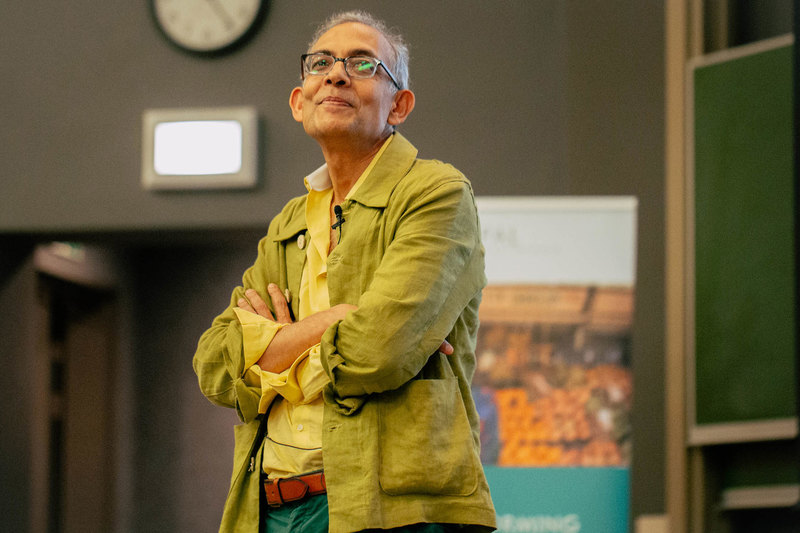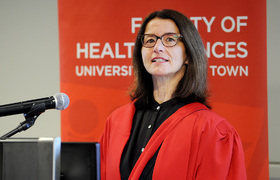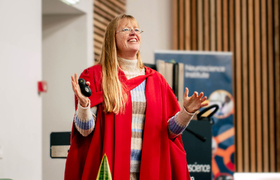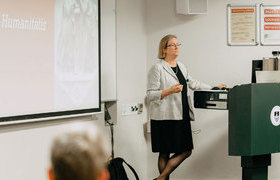UCT hosts Nobel Laureate for lecture on universal basic income in the developing world
19 March 2024 | Story Maya Skillen. Photo Robyn Walker. Read time 8 min.
On 13 March, the University of Cape Town (UCT) welcomed Nobel Laureate Professor Abhijit Vinayak Banerjee, an expert in development economics, for an open lecture on the potential transformative effects of universal basic income in the developing world.
The hybrid lecture, which was held at UCT’s New Lecture Theatre and livestreamed on Zoom, was organised by the Abdul Latif Jameel Poverty Action Lab (J-PAL) Africa in association with UCT’s Southern Africa Labour and Development Research Unit (SALDRU), where J-PAL Africa’s headquarters are based.
Professor Banerjee, a co-founder of J-PAL, is a Ford Foundation International Professor of Economics at the Massachusetts Institute of Technology in the United States. He’s also the co-recipient of the 2019 Sveriges Riksbank Prize in Economic Sciences in Memory of Alfred Nobel for his work in development economics.
Correcting misconceptions
In his lecture, Banerjee detailed a proof-of-concept study that is being conducted in two of Kenya’s poorest counties, Siaya and Bomet. The study is seeking to understand the underlying economics of universal basic income in developing countries.
“There’s a long history of the idea that if you give poor people money, they’ll stop working ... But there is no evidence of this.”
“There’s a long history of the idea that if you give poor people money, they’ll stop working or undermine themselves in various ways, or that it will start a downward spiral,” Banerjee said in his opening remarks. “But there is no evidence of this.”
He added that evidence from conditional cash transfer programmes – whereby low-income populations are subsidised if they satisfy specific actions, such as sending children to school or making regular health visits – indicates that people are not irresponsible when given extra cash.
“We collected data from about 15 of these programmes and found uniformly, across the world, that it has no effect on how hard people work,” Banerjee said. “That sort of evidence put us in the place where we could ask whether providing a stable source of earnings would cause people to eventually stop working or whether it would transform their lives.”
The case of Kenya
The study investigated the impacts of giving individuals in 40 Kenyan villages a universal basic income of US$0.75 (approximately R14) per adult per day over 12 years. This was compared to two less expensive interventions: a two-year version (where payments were identical to the 12-year intervention) and a lump sum of $500 (approximately R9 000) per adult; the equivalent of the two-year income.
Banerjee pointed out that the three interventions helped people in different ways, with two notable factors driving their behaviour: a lack of access to credit and limited savings opportunities.
“People have a hard time borrowing and lending; this is important, because if you could borrow, you would have started a business already,” he said. “Also, saving is hard – banks are far away and typically not keen to give accounts to poor people because they deposit very small amounts.”
Banerjee presented data that had been collated when the two-year intervention had ended, as that was the point at which all participants would have received exactly the same amount of money. Impressively, researchers managed to track 91% of recipients.
The results
Researchers found that several new enterprises have been created among participants who are receiving the long-term income (over 12 years) and those who received the lump sum. Across sectors, self-employment has gone up and wage employment down.
In agriculture, long-term and lump sum participants have started new animal husbandry businesses, whereas short-term participants (who received income over two years) invested in what they have, resulting in more productive farms.
“The ones who want to make the most of their money right now, because they know the money will run out, opt for a divisible product [like fertiliser], while the ones who are thinking about the future go for the indivisible product [like cows],” Banerjee explained.
Tellingly, the study found that the number of hours people spent working has increased markedly.
They’re also eating better; they’re eating more protein and have a more diverse diet.”
“People are working harder,” Banerjee said, “which is not surprising, except that’s the prejudice we face – the idea that when people get richer, they stop working and enjoy more leisure. In fact, they’re working harder – if you have more fertiliser, you have more grain, so you spend more time harvesting.”
Interestingly, total consumption has gone up the least among long-term participants.
“They’re probably saving the money for their business,” Banerjee said. “They’re also eating better; they’re eating more protein and have a more diverse diet.”
While there was more savings and a decline in borrowing, the more notable investment vehicle that long-term and lump sum participants are making use of is a rotating savings and credit association (ROSCA), known as a merry-go-round in Kenya.
“Ten people may decide to each put in 100 Kenyan shillings [KES] a week for about 10 weeks, so that’s 1 000 KES a week,” Banerjee explained. “Then they have a lottery, and whoever wins it the first time, gets 100 KES.” That person sits out the next lottery, and the remaining nine people play, and on it goes.
“Participation in a ROSCA is a way to transform small amounts of money into big amounts. This is what long-term and lump sum recipients are doing, as they may want to expand their businesses. But short-term recipients don’t participate in ROSCAs. This suggests that even though the cash flow is the same, behaviour is very different.”
Banerjee mentioned various other social outcomes, placing emphasis on the well-being measure, having found that depression has gone down dramatically. The measure is most responsive among long-term recipients.
“Lump sum recipients might be consuming more, but they’re stressed out because their business might fail,” he explained. “Long-term recipients have the assurance of money still coming in even if their business fails. This shows that even though they’re consuming the least, their well-being is the highest.”
Final thoughts
It’s too soon to know which intervention is best, Banerjee said in conclusion. He added that acting on savings and credit constraints may be beneficial, and that the possibility of a wealth transfer instead of universal basic income should be considered.
“The fact that short-term and long-term recipients behave differently suggests that ‘lumpiness’ is a problem – that is, being able to turn little amounts of money into bigger amounts,” he explained. “The role of the ROSCA is a real issue, so there’s some value to having a lump sum.”
However, he added, researchers can’t be sure what will happen in the long run.
“If you were to take the long-term income and turn it into a lump sum, there might be a lot of new businesses. Whether that will make people better or worse off, we don’t know – perhaps the businesses will close or some might be unlucky. All kinds of shocks might happen and they won’t recover. These remain open questions.”
 This work is licensed under a Creative Commons Attribution-NoDerivatives 4.0 International License.
This work is licensed under a Creative Commons Attribution-NoDerivatives 4.0 International License.
Please view the republishing articles page for more information.










